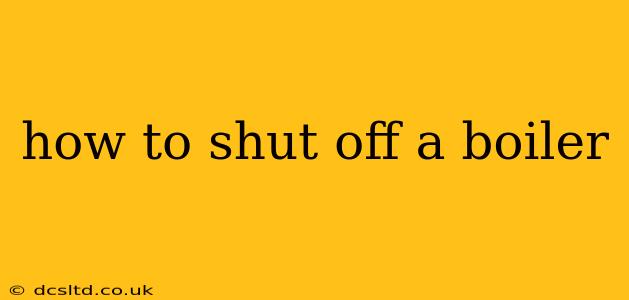How to Shut Off a Boiler: A Comprehensive Guide
Turning off your boiler might seem simple, but doing it correctly is crucial for safety and efficiency. This guide covers various boiler types and provides step-by-step instructions, addressing common questions and concerns. Remember, if you're unsure about any step, always consult a qualified heating engineer.
What Type of Boiler Do You Have?
Before we begin, it's essential to know what type of boiler you have. The shutdown process can vary slightly depending on the model and its controls. Common types include:
- Combi boilers: These heat water on demand and don't have a hot water storage tank.
- System boilers: These heat water that's stored in a hot water tank.
- Regular boilers: Similar to system boilers, but they also require a separate feed and expansion tank.
Knowing your boiler type helps ensure you follow the correct procedure. Your boiler's manual should clearly state the type.
How to Turn Off a Boiler: A Step-by-Step Guide
The most common method involves using the boiler's on/off switch and the central heating controls. However, the exact process might differ slightly depending on your boiler's make and model.
-
Locate the Boiler's On/Off Switch: This is usually a clearly marked switch located on the boiler itself. It may be a simple rocker switch or a more sophisticated control panel.
-
Turn Off the Boiler at the Switch: Simply toggle the switch to the "off" position. This cuts the power supply to the boiler.
-
Turn Off the Central Heating System: This is typically done via a thermostat or programmer. Locate the control panel and switch the heating off.
-
Check the Boiler's Display (If Applicable): Modern boilers often have digital displays. Ensure the display confirms that the boiler is off and the heating system is also off.
-
Leave the Hot Water Taps Running (Optional but Recommended): If you are turning off the boiler for an extended period, especially during freezing temperatures, it's advisable to leave a couple of hot water taps running very slightly. This helps prevent the pipes from freezing.
What Happens When You Turn Off Your Boiler?
When you turn off your boiler, it stops heating both your central heating system and your domestic hot water. The temperature will gradually decrease until the system cools completely. Turning it off during warmer months or for short periods is generally safe.
How to Shut Off a Boiler for the Summer?
For longer periods, such as during the summer months, you might want to take extra precautions:
-
Isolate the Boiler (if possible): Some boilers allow you to isolate the gas supply or water supply using shut-off valves. Check your boiler's manual to see if this is an option. Only attempt this if you are comfortable with this procedure, otherwise call a qualified plumber.
-
Drain the System (if necessary): In some cases, particularly if you live in a region with harsh winters, draining the system entirely might be advisable to prevent freezing. This is a specialized task and should be performed by a qualified professional.
-
Consider a Boiler Service: Before storing your boiler for the summer, it is advisable to schedule a yearly service. This will ensure your boiler is in excellent working order.
What if My Boiler Won't Turn Off?
If your boiler fails to turn off when using the normal on/off switch or the central heating controls, there might be a fault. Do not attempt any DIY repairs. Instead, contact a qualified heating engineer to investigate the problem and resolve it safely.
How Often Should I Turn Off My Boiler?
Turning off your boiler isn't usually necessary unless you're going away for an extended period or if you're experiencing a problem with the unit. During colder months, keeping it on is often most efficient, even if only running low to maintain a minimum level of temperature.
Remember, consulting your boiler's instruction manual is always the best practice. Each boiler model has its own nuances, and the steps mentioned here are general guidelines. Safety always comes first!
